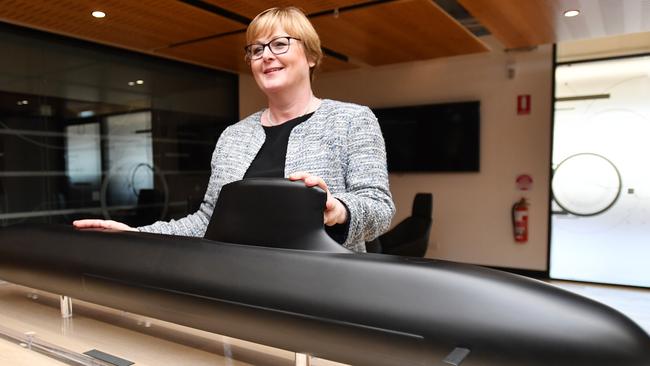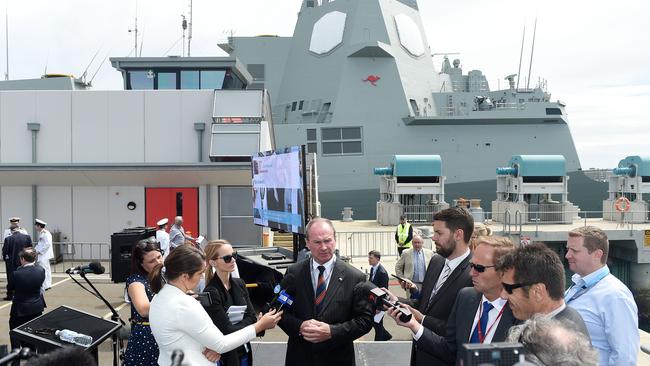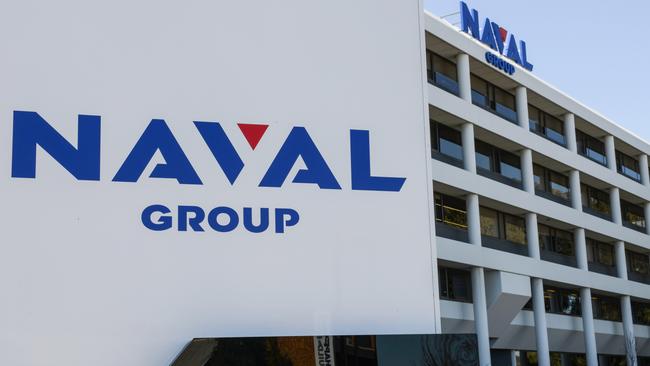Naval Group preferred French connection over local suppliers for subs build, critics argue
French company Naval Group was not making a genuine effort to build Australian industry capacity, critics argue, and in doing so ‘overplayed its hand’.
Business
Don't miss out on the headlines from Business. Followed categories will be added to My News.
The French “overplayed their hand’’ in sending high value submarine work back to France, former South Australian defence industries minister Martin Hamilton-Smith says, while one fed up tech company boss said he’d be glad to help Naval Group pack their bags.
Mr Hamilton-Smith, himself a former special forces soldier, said even in the early stages of the now-scuttled deal with French company Naval Group to build the Future Submarines, they had been reluctant to specify what skills and capabilities were needed to build out Australia’s local shipbuilding capability.
Naval Group has rejected the notion that it was favouring French suppliers however, saying it had been committed to creating Australian jobs and capability for the entirety of the past five years when it was contracted to deliver the Future Submarines.

Mr Hamilton-Smith, who now heads up the Australian Sovereign Capability Alliance, has written to Prime Minister Scott Morrison urging him to appoint a “sovereign capability minister’’ to address the glaring gaps in the nation’s manufacturing capability - which were laid bare when international supply chains were tested by the Covid-19 pandemic.
And he warned that the Federal Government must not make the same mistakes with the recently-announced AUKUS nuclear submarine deal as it did with the French.
Mr Hamilton-Smith said the deal with the French started with a commitment to 90 per cent of the work being done locally, which dropped to 80, then 70 and “after quite a scuffle” to 60 per cent.
He characterised getting information on the skills needed from Naval Group during his time as a minister in the SA Government as like “pulling teeth” and said they were “doing the bare minimum they needed to do’’.
“They overplayed their hand,’’ he said.
Mr Hamilton-Smith said the government’s move to pull the deal sent a message to other tier one defence primes such as BAE Systems, which is contracted to deliver Australia’s Future Frigates program, also based out of the Osborne shipyards, that local content requirements were serious.
The ASCA has made a submission to the Federal Government, pointing out that as “Australia is presently the lowest producer in the OECD of the manufacturing products it consumes, our dependency on imports is therefore the highest of OECD nations’’.

This was across all areas, not just defence, with Mr Hamilton-Smith pointing to the need to rapidly scale up face mask manufacture last year when the pandemic hit.
The submission argues there has been a “dramatic decline in industrial complexity within the Australian economy’’, with engineering, science and technology all suffering.
ASCA argues the AUKUS deal is a huge opportunity to revitalise the manufacturing sector.
“It is an opportunity offering added value which must be measured, costed, optimised, and added into the national equation, not squandered in the pursuit of short-term savings to the defence budget,’’ the submission says.
“To argue the case for greater Australian sovereign capability is therefore to make the case for Australian manufacturing reform, and in turn the case that as much of the work flowing from naval ship building must be performed by Australian manufacturers.’’
One tech company which News Corp Australia spoke to on condition of anonymity, said Naval Group strung it along for years, making several excuses as to why the work in question could only be done in France.
The representative said they visited France several times, filled out reams of paperwork in order to prove their capability, and were brushed aside with feeble excuses.

“Anything I can do to help them pack their bags I will,’' the representative said.
“They kept finding reasons why this had to be done in France. They were prevaricating immensely.’’
Another well-placed industry source said “if you were being cynical, you’d think they were finding reasons why the work had to be done in France, not Australia’'.
The ASCA report says there is a “high level of cynicism .... when Australians see their taxes spent creating jobs and enterprise someone else’s country through ‘off the shelf’ purchases of ships or submarines’’.
Overseas defence suppliers who win contracts here must be compelled to “exhaust every opportunity to partner with and uplift genuinely Australian owned enterprises to the required standard’’, it says.
READ MORE:Christopher Pyne: why the Naval Group deal was ditched
“All operationally critical intellecutal property and technology used by overseas firms must be genuinely relocated and controlled from Australia by Australians.’’
“Washington ensures these companies have US boards and management, and proprietary ownership of essential functions in the homeland.
“In a crisis, primes cannot be allowed at the direction of parent foreign governments, to denude or strip people, IP, or capability away back to home markets, thus putting at risk Australian naval capability.’’
Mr Hamilton-Smith said the US employed this model, and it should be replicated here.
Naval Group said on Thursday it had been “fully committed to the creation of Australian jobs, and capability, during the five-year development of the Future Submarine Program’’.
“This included our commitment that at least 60 per cent of the contract value would be spent in Australia, over the design and build of 12 new and advanced submarines.
“The program has been terminated in its early stages, but Naval Group had announced more than $1 billion in opportunities for local companies including the manufacture of complex submarine parts and to supply shipyard equipment. Contracts had already been signed with Australian companies, right across the country.
“These commitments would have brought new technologies to Australia, significantly boosting sovereign advanced manufacturing capability in the next few years.’’
Naval Group said it had been training Australians in France, to build industry specific skills.
“We were also staffing Naval Group Australia with around 350 people today, with a target of almost 2000, as well supporting initiatives to train a qualified Australian workforce.”
Originally published as Naval Group preferred French connection over local suppliers for subs build, critics argue



